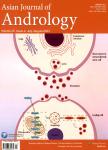Specific changes in the expression of imprinted genes in prostate cancer--implications for cancer progression and epigenetic regulation
前列腺癌印记基因表达的特殊变化一前列腺癌发展和表观遗传调控的预示作者机构:Department of Urology Heinrich Heine University 40225 Duesseldorf Germany 1
出 版 物:《Asian Journal of Andrology》 (亚洲男性学杂志(英文版))
年 卷 期:2012年第14卷第3期
页 面:436-450,I0007页
核心收录:
学科分类:10[医学]
基 金:supported by the Deutsche Forschungsgemeinschaft and the Deutsche Krebshilfe
主 题:androgen signalling imprinted genes loss of imprinting PI3K signalling prostate cancer
摘 要:Epigenetic dysregulation comprising DNA hypermethylation and hypomethylation, enhancer of zeste homologue 2 (EZH2) overexpression and altered patterns of histone modifications is associated with the progression of prostate cancer. DNA methylation, EZH2 and histone modifications also ensure the parental-specific monoallelic expression of at least 62 imprinted genes. Although it is therefore tempting to speculate that epigenetic dysregulation may extend to imprinted genes, expression changes in cancerous prostates are only well documented for insulin-like growth factor 2 (IGF2). A literature and database survey on imprinted genes in prostate cancer suggests that the expression of most imprinted genes remains unchanged despite global disturbances in epigenetic mechanisms. Instead, selective genetic and epigenetic changes appear to lead to the inactivation of a sub-network of imprinted genes, which might function in the prostate to limit cell growth induced via the PI3K/Akt pathway, modulate androgen responses and regulate differentiation. Whereas dysregulation of IGF2 may constitute an early change in prostate carcinogenesis, inactivation of this imprinted gene network is rather associated with cancer progression.



